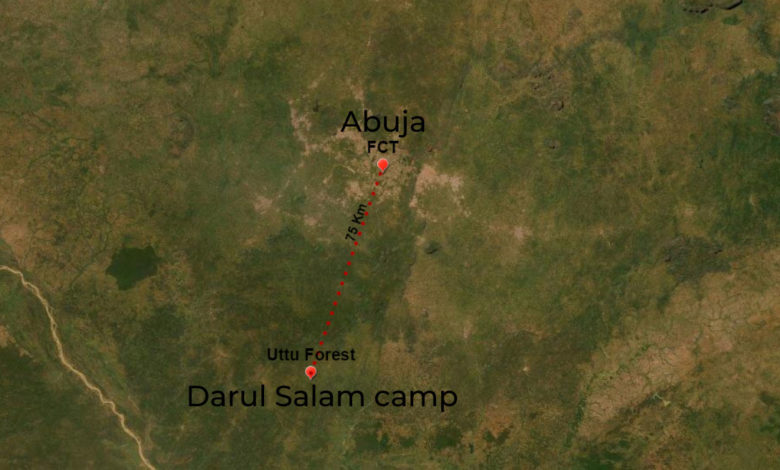ANALYSIS: Examining The Re-emergence Of ‘Darul Salam’

Sometime in August 2009, a detachment of Nigerian Police comprising officers from Niger State Command and the Federal Capital Territory (FCT) raided a settlement occupied by an Islamist sect known as Darul Salam.
The little known set was dislodged from an area in Mokwa Local Government Area of Niger State, Northcentral Nigeria.
Few weeks to the raid, Nigerian President at the time, late Umar Musa Yar’Adua had given a matching order to Nigerian troops to respond to an uprising in Maiduguri, Borno State, Northeast by another Islamist sect, Jamā’at Ahl as-Sunnah lid-Da’wah Wa’l-Jihād later known as Boko Haram.
Members of Darul Salam, which means “city of Islam” had previously maintained they were a peaceful and pious community governed by Sharia law, isolating themselves from the rest of the sinful world.
According to Bashir Abdullahi Sulaiman, the group’s erstwhile leader, in an interview with Weekly Trust, the State Security Service, Nigeria’s domestic intelligence agency and police made them sign undertaking at different times to be peaceful.
Darul Salam emergence dates back to 1993 when members migrated to Mokwa and sought local authorization to set up a settlement. The group’s ideological doctrine and practices attracted more people, and its membership base increased to about 4000 in 2009. Some members were thought to have migrated from other countries, and others came from different parts of Nigeria.
The group’s members engaged in farming, livestock keeping and trade, while the community schools also taught western education in a form that aligned with the sect’s ideology.
Babangida Aliyu, who at the time was the Governor of Niger State raised the alarm and facilitated the dislodgement of the group to prevent another security threat like Boko Haram, arrested members were held in camps and subsequently repatriated to their states and country of origin.
Though after the military achieved this feat, nothing was heard of Darul Salam- its members went underground and remained inactive until recently when local authorities and security forces reported the reemergence of the group Nasarawa State.
Sources familiar with the group told HumAngle that some of the members joined Boko Haram and other terror groups. Others made their way into secular societies. According to the source, a significant number within the group continues to commit to their doctrine of perpetual connection to their consecration ground.
Audu Bulama Bukarti, an analyst on extremist groups in sub-Saharan African at the Tony Blair Institute in an interview with HumAngle, disclosed that Bashir, Darul Salam’s leader at the time of the raid in Mokwa, has disassociated the disbanded group from the current group terrorising parts of Nasarawa and Kogi states.
Bukarti suggested that some members of the former group that didn’t disengage after the August 2009 raid may have reassembled, under new leadership and perspective.
This, the analyst says, explains the transition from a peaceful group to a violent one.
But he was quick also to note that the current group may have been tagged Darul Salam by locals and security forces because they share similar Modus operandi with the disbanded one in Niger State and might not be because of a direct link.
In April 2020, a joint Nigerian Military operation targeted the group’s camp in Toto Local Government of Nasarawa State. However, a few weeks later, in May, Abdullahi Sule, Governor of Nasarawa State raised the alarm on the reemergence of the group during a meeting with the Nigerian President, Muhammadu Buhari at the Presidential Villa, Abuja.
Speaking with State House Correspondents after the meeting, Sule attributed the recent kidnappings and banditry in the state to the reemergence of the group and appealed to the Federal Government for the deployment of more security personnel to the state to handle the situation.
In response to the threat, the Defence Headquarters Operation Whirl Stroke escalated joint military operation against the group. With the Nigerian Air Force dedicating attack helicopters and ISR aircraft stationed in Nnamdi Azikiwe International Airport to provide air support to ground troops, the Darul Salam members in the state were again dislodged.
The operation on August 25, led to the arrest of 410 members and rescue of hostages including women and children.
Troops of Operation Whirl stroke and other security agencies deployed at Uttu in Toto Local Government spearheaded the operation.
Twenty-four hours later, troops also raided a bomb-making factory following actionable technical and human intelligence on the activities of the terrorist group in the area.
In response to a question on a possible connection between the group and Boko Haram, Bukarti explained that Boko Haram mentioned their presence in Niger, not Nasarawa.
He advised security forces to maintain vigilance despite the recent operations against the group.
Currently, the Federal Government is expanding the presence of security forces in Nasarawa State to complement law enforcement, paramilitary and the Brigade of Guards, a special section of the military dedicated to protecting Nigeria’s President and the Federal capital.
The Nigerian Army 4th Special Forces Command Barracks was recently set up in Doma Local Government Area and, a few weeks ago, the Nigerian Police inaugurated the Police Mobile Force Training College, Endeh Hills, in Nasarawa-Eggon Local Government Area of the state.
Support Our Journalism
There are millions of ordinary people affected by conflict in Africa whose stories are missing in the mainstream media. HumAngle is determined to tell those challenging and under-reported stories, hoping that the people impacted by these conflicts will find the safety and security they deserve.
To ensure that we continue to provide public service coverage, we have a small favour to ask you. We want you to be part of our journalistic endeavour by contributing a token to us.
Your donation will further promote a robust, free, and independent media.
Donate HereStay Closer To The Stories That Matter




